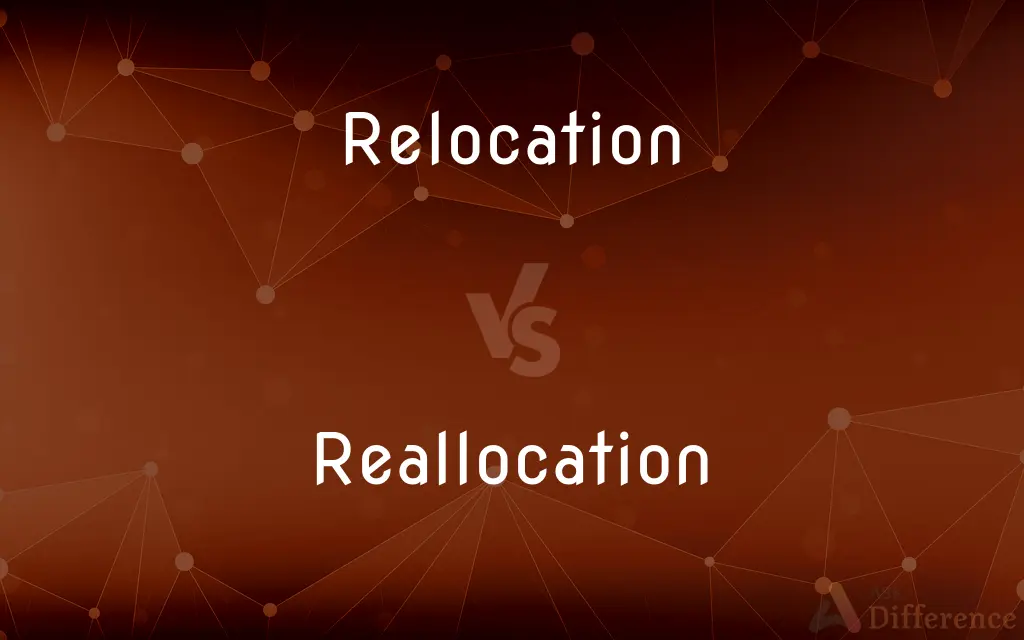Relocation vs. Reallocation — What's the Difference?
By Fiza Rafique & Maham Liaqat — Updated on March 26, 2024
Relocation refers to moving to a new place, often for living or business purposes, while reallocation involves redistributing resources, tasks, or employees within an organization.

Difference Between Relocation and Reallocation
Table of Contents
ADVERTISEMENT
Key Differences
Relocation typically involves physical movement, such as a person, family, or business moving from one location to another, often for reasons like employment opportunities, personal preferences, or operational needs. On the other hand, reallocation is more about strategic redistribution within an existing framework, such as reallocating funds, resources, or personnel to optimize performance, address changing priorities, or improve efficiency within an organization or system.
While relocation can signify a significant life event or business strategy shift, requiring substantial planning, effort, and adjustment, reallocation is often a managerial or operational decision, focused on maximizing the use of available resources or adapting to new circumstances without necessarily involving physical movement. For example, a company might relocate its headquarters to another city to improve its market position, whereas it might reallocate its budget to focus more on digital marketing over traditional advertising.
Relocation is often a more visible and sometimes disruptive process, with tangible impacts on the lives of individuals or the operations of businesses. It encompasses dealing with real estate, regulatory requirements, and logistical challenges. Reallocation, in contrast, tends to be a behind-the-scenes activity, crucial for operational efficiency but less noticeable outside the immediate context in which it occurs.
The decision to relocate can be driven by a variety of factors including economic, social, or environmental considerations, and involves evaluating a wide range of implications from cost to quality of life. Reallocation, meanwhile, is primarily driven by performance metrics, organizational goals, and strategic planning, requiring a deep understanding of the current allocation's strengths and weaknesses.
Both relocation and reallocation require careful planning and consideration of the impacts on those involved. However, relocation often demands a broader scope of planning, encompassing personal, professional, and logistical aspects, while reallocation focuses on optimizing current operations, strategies, or allocations within an existing setup or system.
ADVERTISEMENT
Comparison Chart
Definition
Moving to a new location.
Redistributing resources or tasks.
Primary Focus
Physical movement.
Resource optimization.
Key Considerations
Logistics, cost, adjustment to new settings.
Efficiency, performance, strategic goals.
Impact
Life changes, operational shifts.
Operational efficiency, strategic adjustments.
Decision Drivers
Economic, personal, environmental factors.
Performance metrics, organizational goals.
Compare with Definitions
Relocation
Can affect businesses and individuals alike.
The store's relocation attracted more customers.
Reallocation
Redistributing existing resources or tasks.
The project's reallocation of funds led to its successful completion.
Relocation
Moving from one place to another.
The company's relocation to New York was driven by market expansion goals.
Reallocation
A strategic decision within organizations.
Reallocation of staff to different departments improved efficiency.
Relocation
Involves personal and logistical adjustments.
Relocation packages often include housing assistance.
Reallocation
Focuses on optimizing current setups.
Budget reallocation allowed for increased research and development investment.
Relocation
A significant change in physical location.
Their relocation across the country was for a new job opportunity.
Reallocation
Aims to enhance performance or adapt to changes.
Reallocation of marketing efforts towards digital platforms increased engagement.
Relocation
Requires extensive planning and resources.
Planning our relocation took several months to ensure a smooth transition.
Reallocation
Can involve financial, human, or material resources.
Reallocation of office space accommodated the growing team.
Relocation
To move to or establish in a new place
Relocated the business.
Reallocation
The act of reallocating; a second or subsequent allocation.
Relocation
To become established in a new residence or place of business
Relocated in Ohio.
Reallocation
A share that has been allocated again
Relocation
The act of moving from one place to another.
Reallocation
A new apportionment (especially a reallotment of congressional seats in the United States on the basis of census results)
Relocation
Of a lease.
Relocation
(computing) The assigning of addresses to variables either at linkage editing, or at runtime.
Relocation
A second location.
Relocation
Renewal of a lease.
Relocation
The transportation of people (as a family or colony) to a new settlement (as after an upheaval of some kind)
Relocation
The act of changing your residence or place of business;
They say that three moves equal one fire
Common Curiosities
Can a relocation involve reallocation?
Yes, relocation might involve reallocation of resources or tasks as part of the moving process or strategic restructuring.
What is the goal of reallocation?
The goal of reallocation is to optimize the use of resources, improve efficiency, or better align with strategic objectives.
Is reallocation a common practice in businesses?
Yes, reallocation is a common and necessary practice for businesses seeking to stay competitive and adapt to market changes.
What triggers a relocation?
Relocations are often triggered by job opportunities, lifestyle changes, or business strategy shifts.
Can relocation improve a company’s performance?
Yes, if strategically planned, relocation can improve access to markets, talent, and operational efficiencies, boosting performance.
What factors influence reallocation decisions?
Factors include organizational goals, performance data, market trends, and resource availability.
How does reallocation impact employees?
Reallocation can impact employees by changing their roles, responsibilities, or departments, potentially leading to growth opportunities or challenges.
What are the challenges of relocation?
Challenges of relocation include logistical issues, financial costs, emotional stress, and adjustment to a new environment or culture.
What is the difference between relocation and expansion?
Relocation involves moving to a new place, while expansion might include opening additional locations without leaving the original.
What assistance is available for those relocating?
Many organizations offer relocation assistance, including financial support, housing, and resources for adjusting to the new location.
How is reallocation viewed by stakeholders?
Stakeholders may view reallocation positively if it leads to better resource use and achievement of strategic goals.
Can reallocation lead to downsizing?
While reallocation focuses on optimization, it can sometimes result in downsizing if it aligns with efficiency and strategic objectives.
How does reallocation affect company culture?
It can positively impact culture by demonstrating adaptability and a commitment to optimizing resources and opportunities.
How do individuals cope with relocation?
Individuals cope with relocation through planning, support networks, and adapting to new surroundings and cultures.
How do companies decide on reallocation?
Decisions are based on analyses of current allocations, strategic goals, and potential for improved efficiency or effectiveness.
Share Your Discovery

Previous Comparison
Evident vs. Apparent
Next Comparison
Collect vs. CollateAuthor Spotlight
Written by
Fiza RafiqueFiza Rafique is a skilled content writer at AskDifference.com, where she meticulously refines and enhances written pieces. Drawing from her vast editorial expertise, Fiza ensures clarity, accuracy, and precision in every article. Passionate about language, she continually seeks to elevate the quality of content for readers worldwide.
Co-written by
Maham Liaqat













































